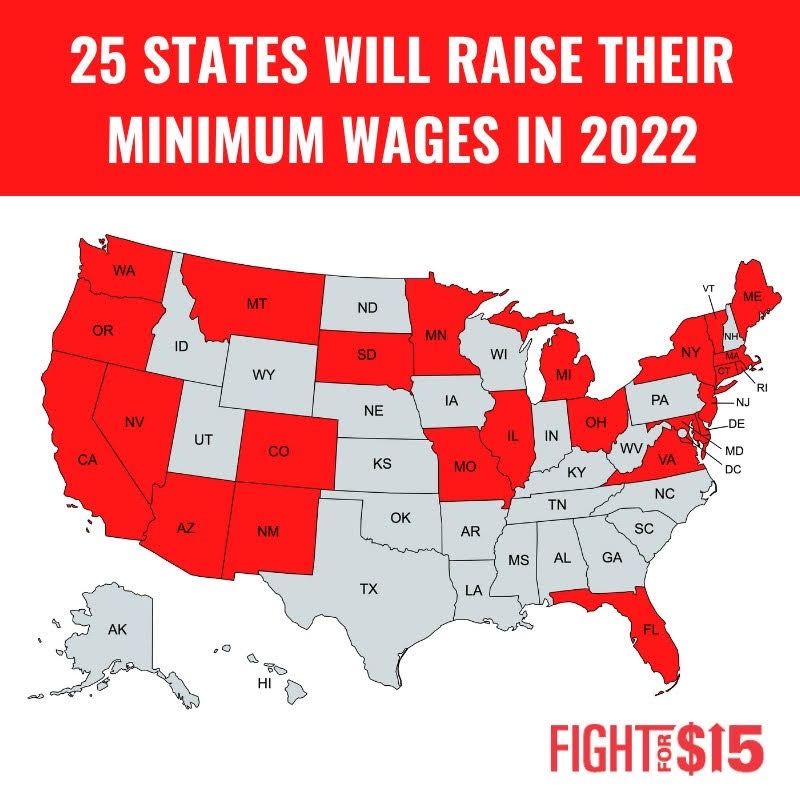Despite historic minimum wage increases, the South still trails behind

Though 25 states will raise the minimum wage this year, only two of those states are in the South. (Graphic via Fight For $15 Florida's Twitter page.)
2022 marks 10 years since fast food workers in New York first went on strike to demand higher wages, better working conditions, and the right to unionize — sparking the Fight For $15 movement. Since that time, the movement has gained traction, with California raising its minimum wage to $15 an hour and several other states passing legislation that will gradually do so.
As the ongoing global pandemic has drawn attention to the fact that the people who keep the country running are overworked and underpaid, workers have continued to strike for higher wages and union rights. In many cases, their demands are being met.
Showing the tremendous strides made by Fight for $15, a record number of states and localities are raising their wages this year. In the recent National Employment Law Project (NELP) report titled "Raises from Coast to Coast in 2022," Yannet Lathrop details how on the first day of this year 56 cities, counties, and states across the country raised their minimum wage, with many of these jurisdictions now having a minimum wage that exceeds $15 an hour. An additional 26 jurisdictions will raise the minimum wage later this year.
In the first nine years since its founding, the Fight for $15 movement resulted in "$150 billion in higher pay for 26 million workers," Lathrop notes.
But these victories have not been evenly felt by all workers nationwide. "Twenty states have refused to raise their wage floors above the federal rate for over a decade," as Lathrop points out. "Roughly half of those states are in the U.S South, where a majority of Black workers live, and where, not surprisingly, they experience higher levels of poverty and downward economic mobility."
Of the 13 Southern states, only Florida and Virginia are among the over 80 jurisdictions that will raise their wages this year. Both states are among the 11 that passed legislation in recent years to gradually raise their minimum wage to $15 an hour. At the start of the year, Virginia raised its minimum wage from $9.50 to $11 an hour. For a full-time, full-year minimum wage worker, this results in an annual wage increase of $3,120, according to the Economic Policy Institute (EPI). In September, Florida's minimum wage will also increase to $11 an hour.
Meanwhile, eight Southern states have minimum wages equal to the current federal minimum of $7.25, which is not enough to lift a family of two above the poverty line: Alabama, Kentucky, Louisiana, Mississippi, North Carolina, South Carolina, Tennessee, and Texas. Georgia's minimum wage is just $5.15 an hour, so the federal standard applies in most cases.
According to EPI, since the federal minimum wage was last raised in 2009 its purchasing power has declined by more than 21%, further exacerbating the inequity between states that have raised their minimum wages and states that have not. Thirty states have minimum wages that are higher than $7.25, but only four Southern states do: Arkansas, Florida, Virginia, and West Virginia.
Additionally, Southern states have disproportionately passed preemption laws that bar local jurisdictions from raising their wages higher than the state's minimum. So while 39 cities and counties across the country have minimum wages that are higher than the state's, none of these localities are in the South.
According to an article in the nonpartisan Berkeley Political Review, "if minimum wage growth had tracked the growth in workers' productivity since 1968, the minimum wage would be $18.42, more than double the federally mandated minimum wage."
While some employers in Southern states have taken it upon themselves to raise their wages in response to the COVID-19 pandemic, these increases have occurred predominately in the health care industry or at universities. Most frontline workers remain vastly underpaid even as their lives are endangered by surging COVID-19 cases. For instance, tipped workers in 16 states — 10 of them in the South — risk their lives for the federal tipped minimum wage of just $2.13 an hour.
The conditions have led nearly 1 million restaurant workers to leave their jobs since December 2019, right before the pandemic hit. Many others have said that they will stay only if they receive a livable wage.
According to the EPI report, federal legislation like the Raise the Wage Act that was introduced in Congress last year by Democratic Rep. Bobby Scott of Virginia and Independent Sen. Bernie Sanders of Vermont is a "smart policy choice" made even more urgent by rising consumer prices. So far that legislation has not advanced.
"The longer Congress waits to enact an increase, the larger that increase will need to be to establish an adequate wage floor," EPI noted.
Tags
Rebekah Barber
Rebekah is a research associate at the Institute for Southern Studies and writer for Facing South.
